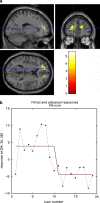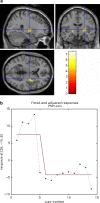Decreased blood-brain barrier P-glycoprotein function in the progression of Parkinson's disease, PSP and MSA
- PMID: 18265929
- PMCID: PMC2468317
- DOI: 10.1007/s00702-008-0030-y
Decreased blood-brain barrier P-glycoprotein function in the progression of Parkinson's disease, PSP and MSA
Abstract
Decreased blood-brain barrier (BBB) efflux function of the P-glycoprotein (P-gp) transport system could facilitate the accumulation of toxic compounds in the brain, increasing the risk of neurodegenerative pathology such as Parkinson's disease (PD). This study investigated in vivo BBB P-gp function in patients with parkinsonian neurodegenerative syndromes, using [11C]-verapamil PET in PD, PSP and MSA patients. Regional differences in distribution volume were studied using SPM with higher uptake interpreted as reduced P-gp function. Advanced PD patients and PSP patients had increased [11C]-verapamil uptake in frontal white matter regions compared to controls; while de novo PD patients showed lower uptake in midbrain and frontal regions. PSP and MSA patients had increased uptake in the basal ganglia. Decreased BBB P-gp function seems a late event in neurodegenerative disorders, and could enhance continuous neurodegeneration. Lower [11C]-verapamil uptake in midbrain and frontal regions of de novo PD patients could indicate a regional up-regulation of P-gp function.
Figures



References
-
- Bain LJ, LeBlanc GA. Interaction of structurally diverse pesticides with the human MDR1 gene product P-glycoprotein. Toxicol Appl Pharmacol. 1996;141:288–298. - PubMed
-
- Bartels AL, van Berckel BNM, Lubberink M, Luurtsema G, Lammertsma AA, Leenders KL (2007) Blood–brain barrier P-glycoprotein function is not impaired in early Parkinson’s disease. Final stage of review ed - PubMed
-
- Burn DJ (2006) Parkinson’s disease dementia: what’s in a Lewy body? J Neural Transm Suppl 361–365 - PubMed
Publication types
MeSH terms
Substances
LinkOut - more resources
Full Text Sources
Other Literature Sources
Medical
Miscellaneous

